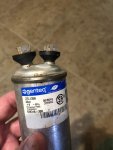Pentair filter pump (five years old) was running just fine this morning. Then this afternoon, I noticed it stopped (timer is supposed to have it running until 6 p.m.).
The breaker for the pump had tripped. I turned off the pump via the timer switch, flipped the breaker off and back on, and then turned the pump back on (again, via the timer switch). The pump revved up as it normally does, for literally one second, and then the breaker tripped again. I repeated this several times, with the same result.
It hasn't rained, so the breaker box did not get wet. The other breakers inside the box (lights, spa blower, septic pump, GFI outlet) all work just fine, so the problem seems isolated to the pump breaker and/or the pump itself.
One thing I did notice - when I flip the pump breaker off and then back on (but before I try to switch the pump itself back on), I hear a few soft clicks/buzzing from behind the breaker switch.
Of course, stuff like this always seems to happen on a weekend, so until I can get someone to look at this on Monday or Tuesday, I am left with a nagging fear that my pump is shot.
I am hoping that these symptoms - particularly the clicking/buzzing from the breaker switch - are more indicative of just a bad breaker, which would be a relatively quick and cheap repair.
No guarantees, of course, but if anyone here knowledgeable about such things could set my mind at ease, I would be very grateful.
Please and thank you!
The breaker for the pump had tripped. I turned off the pump via the timer switch, flipped the breaker off and back on, and then turned the pump back on (again, via the timer switch). The pump revved up as it normally does, for literally one second, and then the breaker tripped again. I repeated this several times, with the same result.
It hasn't rained, so the breaker box did not get wet. The other breakers inside the box (lights, spa blower, septic pump, GFI outlet) all work just fine, so the problem seems isolated to the pump breaker and/or the pump itself.
One thing I did notice - when I flip the pump breaker off and then back on (but before I try to switch the pump itself back on), I hear a few soft clicks/buzzing from behind the breaker switch.
Of course, stuff like this always seems to happen on a weekend, so until I can get someone to look at this on Monday or Tuesday, I am left with a nagging fear that my pump is shot.
I am hoping that these symptoms - particularly the clicking/buzzing from the breaker switch - are more indicative of just a bad breaker, which would be a relatively quick and cheap repair.
No guarantees, of course, but if anyone here knowledgeable about such things could set my mind at ease, I would be very grateful.
Please and thank you!


